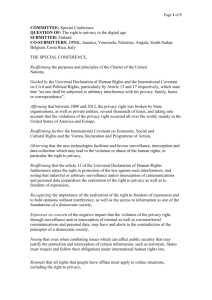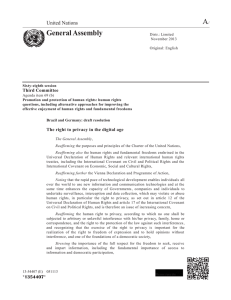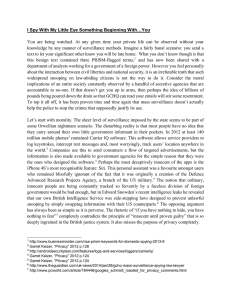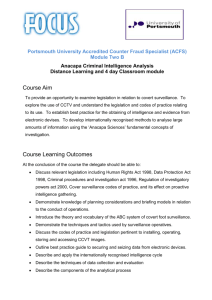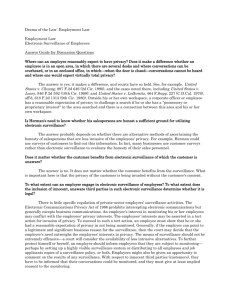INT_CCPR_ICO_CAN_17834_E
advertisement
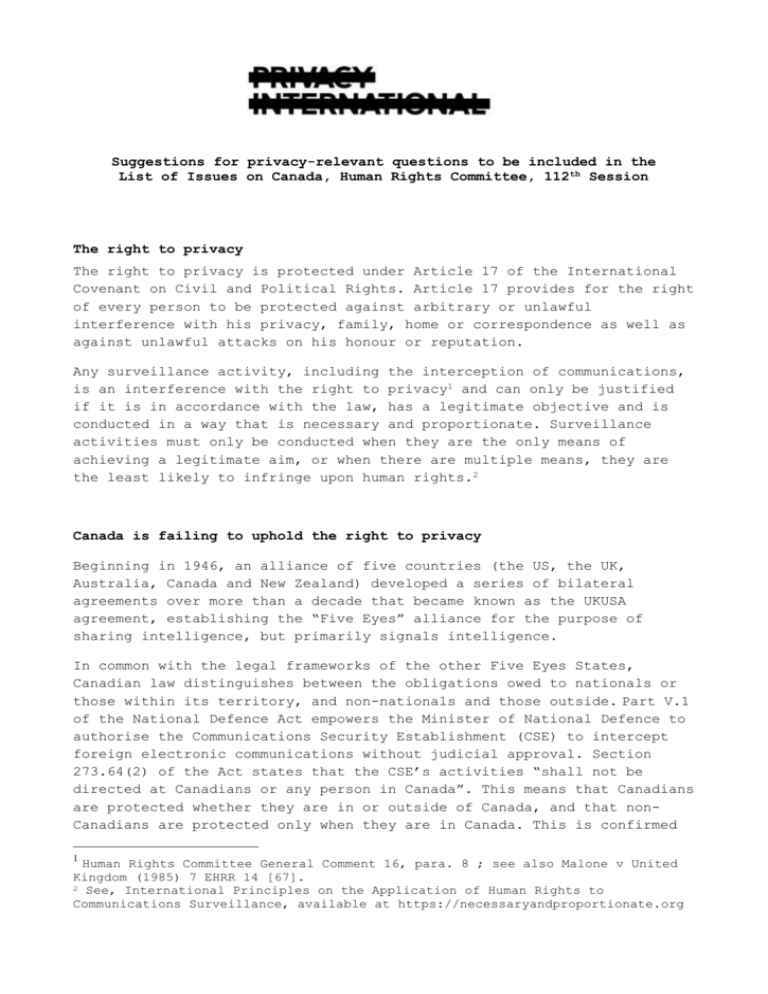
Suggestions for privacy-relevant questions to be included in the List of Issues on Canada, Human Rights Committee, 112th Session The right to privacy The right to privacy is protected under Article 17 of the International Covenant on Civil and Political Rights. Article 17 provides for the right of every person to be protected against arbitrary or unlawful interference with his privacy, family, home or correspondence as well as against unlawful attacks on his honour or reputation. Any surveillance activity, including the interception of communications, is an interference with the right to privacy1 and can only be justified if it is in accordance with the law, has a legitimate objective and is conducted in a way that is necessary and proportionate. Surveillance activities must only be conducted when they are the only means of achieving a legitimate aim, or when there are multiple means, they are the least likely to infringe upon human rights.2 Canada is failing to uphold the right to privacy Beginning in 1946, an alliance of five countries (the US, the UK, Australia, Canada and New Zealand) developed a series of bilateral agreements over more than a decade that became known as the UKUSA agreement, establishing the “Five Eyes” alliance for the purpose of sharing intelligence, but primarily signals intelligence. In common with the legal frameworks of the other Five Eyes States, Canadian law distinguishes between the obligations owed to nationals or those within its territory, and non-nationals and those outside. Part V.1 of the National Defence Act empowers the Minister of National Defence to authorise the Communications Security Establishment (CSE) to intercept foreign electronic communications without judicial approval. Section 273.64(2) of the Act states that the CSE’s activities “shall not be directed at Canadians or any person in Canada”. This means that Canadians are protected whether they are in or outside of Canada, and that nonCanadians are protected only when they are in Canada. This is confirmed 1 Human Rights Committee General Comment 16, para. 8 ; see also Malone v United Kingdom (1985) 7 EHRR 14 [67]. 2 See, International Principles on the Application of Human Rights to Communications Surveillance, available at https://necessaryandproportionate.org by s. 273.65(2)(a), which states that the relevant Minister may only authorise interception of communications if “the interception will be directed at foreign entities located outside Canada”. In making this distinction, Canadian law discriminates against non-Canadian persons on grounds of nationality and national origin because of the special protections granted to people in Canada. A Canadian person is more likely to be present in Canada and vice versa. As the High Commissioner for Human Rights recently noted in her report on the right to privacy in the digital age (A/HRC/27/37), international human rights law is explicit with regard to the principle of nondiscrimination, and the provisions of Article 26 ICCPR should be read together with article 17 to ensure that States do not take discriminatory measures in the context of the right to privacy. The Human Rights Committee has previously noted the importance of “measures to ensure that any interference with the right to privacy complies with the principles of legality, proportionality and necessity regardless of the nationality or location of individuals whose communications are under direct surveillance.”3 Further, there is no clear and accessible legal regime that indicates the circumstances in which intelligence sharing takes place within the Five Eyes alliance. It is clear that Canada’s intelligence services can, at least in principle, obtain extensive access to communications and data that have been intercepted or obtained by the intelligence agencies of other Five Eyes states. However, there is no clear and explicit legal regime providing for the provision of and access to intercepted material by Canada. As the High Commissioner recently stated in her report, “any limitation to privacy rights reflected in article 17 must be provided for by law, and the law must be sufficiently accessible, clear and precise so that an individual may look to the law and ascertain who is authorized to conduct data surveillance and under what circumstances.” It is plain that Canada does not meet this threshold with respect to intelligence sharing. Based on these observations, Privacy International proposes the following questions for the List of Issues: Article 17 • What measures is Canada taking to ensure that the Five Eyes intelligence-sharing arrangement is governed and regulated by accessible, clear and precise laws? Article 26 • 3 What measures is Canada taking to ensure that its communications interception regime complies with the principles of legality, CCPR /C/USA/CO/4, para. 22. proportionality and necessity regardless of the nationality or location of individuals whose communications are intercepted?
